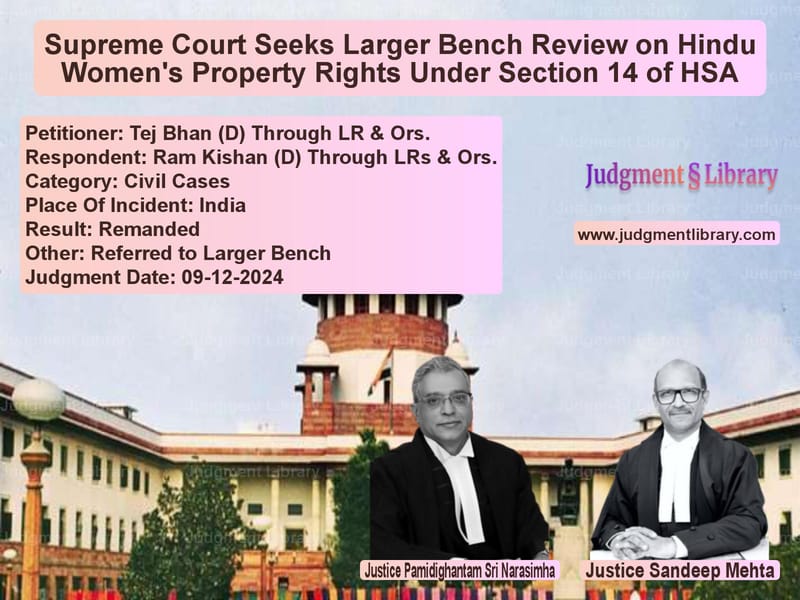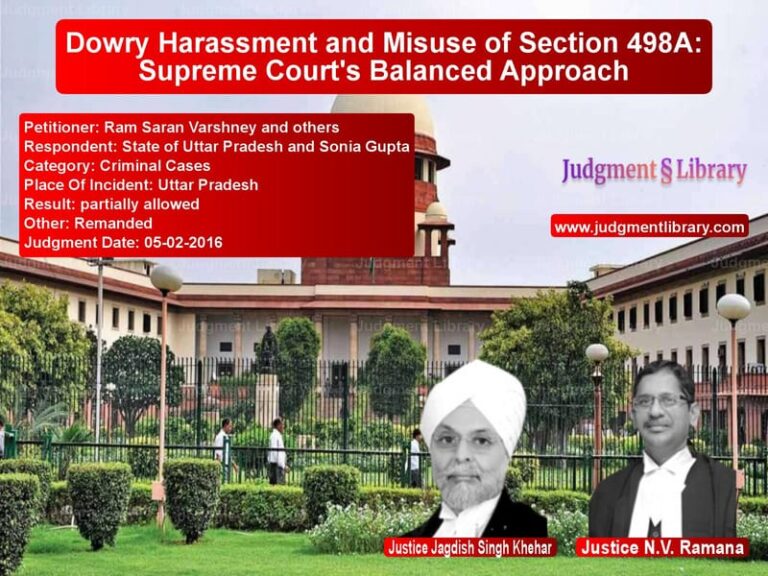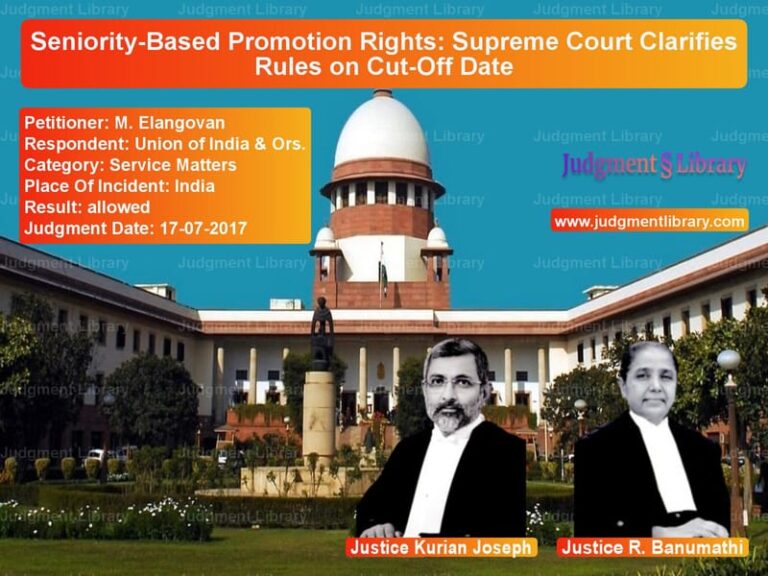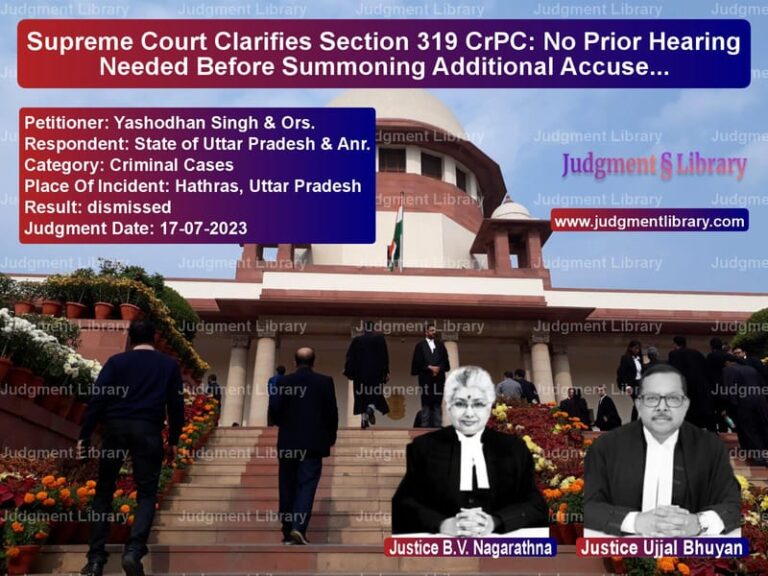Supreme Court Seeks Larger Bench Review on Hindu Women’s Property Rights Under Section 14 of HSA
The Supreme Court of India, in the case of Tej Bhan (D) Through LR & Ors. vs. Ram Kishan (D) Through LRs & Ors., addressed the long-standing legal debate regarding the property rights of Hindu women under Section 14 of the Hindu Succession Act, 1956 (HSA). The ruling, delivered by Pamidighantam Sri Narasimha and Sandeep Mehta, called for a larger bench review due to inconsistencies in past judgments on whether property acquired by a Hindu woman through a will, gift, or maintenance arrangement becomes her absolute property or remains subject to restrictions imposed by the grantor.
Background of the Case
The dispute originated from a property transaction executed through a will dated March 3, 1965, by one Kanwar Bhan, granting a life estate to his wife, Lachhmi Bai. The relevant portion of the will stated:
“After my death, my wife, Smt. Lachhmi Bai, shall have ownership of land measuring about 2½ acres for maintenance purposes. She shall not have the right to mortgage or sell the land.”
After Kanwar Bhan’s death on October 11, 1965, his wife executed a sale deed transferring the property, leading the descendants of Kanwar Bhan (the plaintiffs) to file a suit declaring the sale deed void.
Legal Issues Considered
- Does property granted to a Hindu woman for maintenance or through a will become her absolute property under Section 14(1) of the HSA?
- Does Section 14(2) of the HSA override the general rule of absolute ownership?
- How should conflicting precedents on Section 14(1) and 14(2) be reconciled?
Trial and Appellate Court Decisions
The Trial Court, relying on the landmark ruling in V. Tulasamma v. Sesha Reddy (1977), ruled that since the property was granted to the widow in lieu of maintenance, it became her absolute property under Section 14(1), overriding the restrictions in the will. The plaintiffs’ suit was dismissed.
The First Appellate Court upheld this decision.
However, the High Court reversed the findings, relying on Sadhu Singh v. Gurdwara Sahib Narike (2006), which held that where a will or gift explicitly creates a restricted estate, Section 14(2) applies, and the woman cannot claim absolute ownership.
Supreme Court’s Observations and Analysis
Interpretation of Section 14 of the Hindu Succession Act
The Court noted the complex history of litigation under Section 14 and the divergent precedents. The provision reads:
Section 14(1): Any property possessed by a female Hindu, whether acquired before or after the commencement of this Act, shall be held by her as full owner and not as a limited owner.
Section 14(2): Nothing contained in sub-section (1) shall apply to any property acquired by way of gift, will, decree, or award where the terms of the instrument prescribe a restricted estate.
The Court identified two competing streams of thought:
- Judgments that treat property acquired by a Hindu woman—whether in lieu of maintenance or through a will—as absolute under Section 14(1), as upheld in Tulasamma and Jaswant Kaur v. Major Harpal Singh (1989).
- Judgments that distinguish between property acquired through inheritance (absolute ownership) and property acquired through a specific grant or testamentary instrument (restricted ownership), as seen in Karmi v. Amru (1972) and Sadhu Singh (2006).
Judicial Confusion and Need for Larger Bench
The Court noted that at least 18 Supreme Court judgments have interpreted Section 14 differently, leading to inconsistent rulings. In some cases, courts applied Section 14(1) liberally, holding that any property possessed by a Hindu woman should be considered absolute, while others relied on Section 14(2) to enforce restrictions on property granted through wills or gifts.
The judgment cited the following key rulings:
- Gulwant Kaur v. Mohinder Singh (1987) – Confirmed absolute ownership under Section 14(1).
- Karmi v. Amru (1972) – Held that a will restricting a woman’s rights falls under Section 14(2).
- Masilamani Mudaliar v. Idol of Sri Swaminathaswami (1996) – Held that Section 14(1) prevails in cases of maintenance-related grants.
- Sadhu Singh v. Gurdwara Sahib Narike (2006) – Upheld restrictions under Section 14(2).
The Court concluded:
“It is absolutely necessary that there must be clarity and certainty in the position of law that would govern proprietary interests of parties involving interpretation of Section 14.”
Final Verdict
The Supreme Court, recognizing the far-reaching implications of the issue, referred the matter to a larger bench for definitive resolution. The key directives were:
- The Registry was directed to place the case before the Chief Justice of India for constitution of an appropriate larger bench.
- The Court reviewed and summarized past conflicting judgments to aid the larger bench.
- The decision in Tulasamma was acknowledged as a guiding precedent but required reevaluation in light of subsequent rulings.
Impact of the Judgment
This referral is significant because:
- It will bring much-needed clarity to the property rights of Hindu women.
- It may resolve long-standing ambiguities regarding the interplay of Sections 14(1) and 14(2) of the HSA.
- It will impact thousands of pending property disputes involving Hindu women’s inheritance and maintenance rights.
The larger bench ruling will be crucial in determining whether property granted to Hindu women under limited conditions can be treated as absolute or whether restrictive terms in wills and gifts should prevail.
Petitioner Name: Tej Bhan (D) Through LR & Ors..Respondent Name: Ram Kishan (D) Through LRs & Ors..Judgment By: Justice Pamidighantam Sri Narasimha, Justice Sandeep Mehta.Place Of Incident: India.Judgment Date: 09-12-2024.
Don’t miss out on the full details! Download the complete judgment in PDF format below and gain valuable insights instantly!
Download Judgment: tej-bhan-(d)-through-vs-ram-kishan-(d)-throu-supreme-court-of-india-judgment-dated-09-12-2024.pdf
Directly Download Judgment: Directly download this Judgment
See all petitions in Property Disputes
See all petitions in Succession and Wills
See all petitions in Contract Disputes
See all petitions in Specific Performance
See all petitions in Judgment by P.S. Narasimha
See all petitions in Judgment by Sandeep Mehta
See all petitions in Remanded
See all petitions in Referred to Larger Bench
See all petitions in supreme court of India judgments December 2024
See all petitions in 2024 judgments
See all posts in Civil Cases Category
See all allowed petitions in Civil Cases Category
See all Dismissed petitions in Civil Cases Category
See all partially allowed petitions in Civil Cases Category







